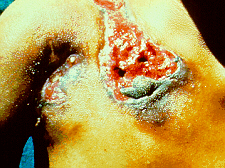Coccidioidomycosis is a “deep fungus” infection which I encounter in both my The Woodlands dermatology and Conroe dermatology offices. Coccidioidomycosis is also called San Joaquin Valley Fever and is caused by the fungus Coccidioidomyces immitis. It is most commonly seen in California and Arizona but there are cases that occur in Texas and other Southwestern states. The fungus resides in animal burrows below the soil but when construction disrupts the soil, the Coccidoidomycosis is aerosolized and can be inhaled into the lungs. Initially, infected patients experience flu like symptoms and pneumonia like findings on chest X-ray. In approximately 20% of cases, patients experience skin lesions once the pulmonary symptoms resolve. Erythema nodosum is a very common skin finding and presents as tender brown nodules on the legs. Erythema multiforme is another skin finding that appears like red bulls-eye targets on the palms, soles, legs, arms, and trunk. The infection in most patients spontaneously resolves, but a chronic form of Coccidioidomycosis may persist in a small minority and ultimately becomes disseminated. Disseminated Coccidioidomycosis occurs in less than 1% of patients and can involve the bones, organs, brain, and skin. The skin lesions in disseminated Coccidioidomycosis appear as warty nodules and deep subcutaneous abscesses. Rarely, can skin lesions occur by direct inoculation through traumatic injury such as a spinter piercing the skin. Diagnosis is made by skin biopsy where large spherules are observed in the dermis, although they are smaller than the spherules of Rhinosporidiosis. A latex agglutination test or complement fixation test is another method to diagnose Coccidioidomycosis. It is important to never attempt to culture Coccidioidomycosis as it is highly infectious in culture and can infect lab workers. Fluconazole daily for one year is usually necessary to treat Coccidioidomycosis.
October 28, 2010




